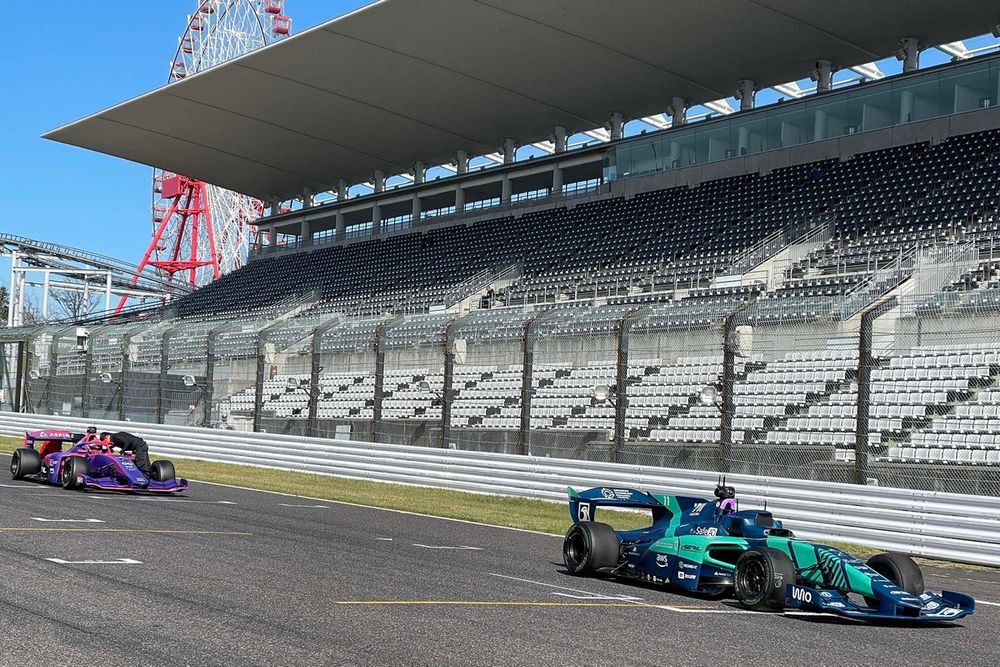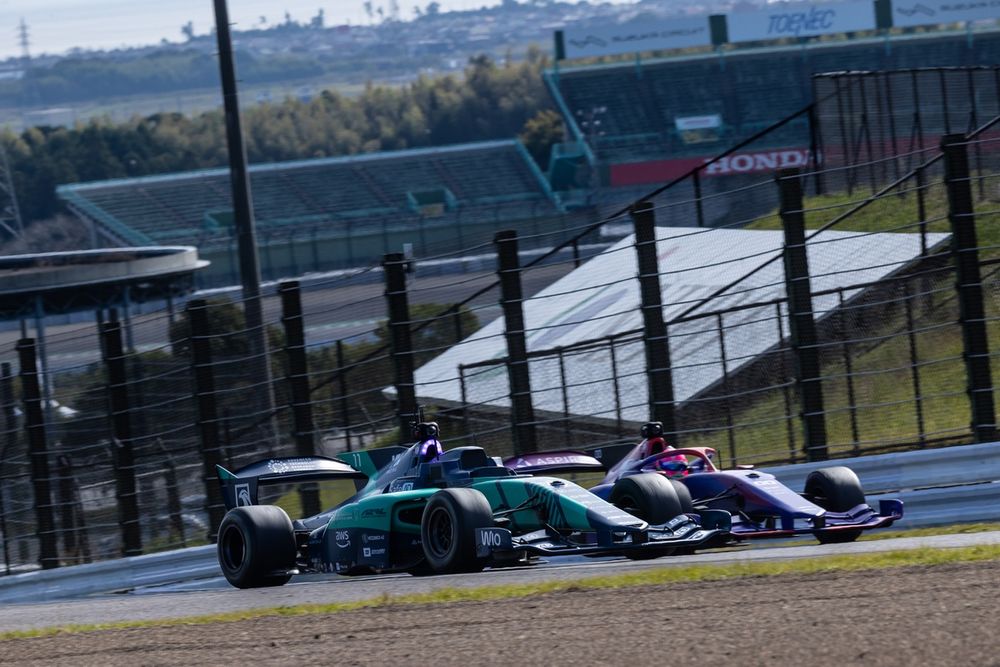The Abu Dhabi Autonomous Racing League (A2RL) took another important step towards launching its second season with a pair of demonstration runs at Suzuka during this weekend’s final round of the season at Super Formula.
As the home of the championship from which the A2RL’s base car, the Dallara SF23, is drawn, it was fitting for the fledgling championship to pay a visit to Suzuka as it builds up towards next April’s showdown at Abu Dhabi’s Yas Marina Circuit.
A pair of demo runs were held at Suzuka, with two AI cars going head-to-head on Saturday morning, before a ‘AI vs. Human’ contest involving ex-Formula 1 racer and A2RL development driver Daniil Kvyat against ‘Yalla’, one of the two AI machines.
Unfortunately, ‘Yalla’ spun up his rear tyres on the formation lap and crashed into the barriers, bringing a premature end to proceedings. The very limited track time allocated to A2RL meant there was no opportunity to roll out the other AI car, ‘Nova’, to take on Kvyat.
But that isn’t to say that A2RL’s Suzuka trip had been for nothing – far from it.
Prior to the demo runs, the A2RL team had spent some 20 days at Suzuka undertaking testing with the two AI cars provided by the TII Racing team, plus a ‘human’ car to be piloted by Kvyat. Teaching the AI the circuit layout was no straightforward task, particularly as the GPS data of the Japanese track provided proved to be less accurate than hoped.
Watch: A2RL: Human vs Machine Suzuka 2024 – Sunday
Unlike Abu Dhabi, which is mostly flat, has plenty of tarmac run-off and features many slow corners, Suzuka is an old-school track with fast, flowing curves that are much more difficult for an AI machine to master. That’s partly because of how tough it is to accurately estimate grip levels on the racing line, and the difficulties the AI car faces using kerbs properly.
That’s why the two AI cars during their private battle on Saturday were only able to produce a best lap in the 2m34s range between them, putting them almost a minute slower than the humans driving similar (but not identical) cars in qualifying just a short while earlier.
Dr Giovanni Pau, the technical director of the TII team that supplied the two cars for the trip to Suzuka, explained that the AI machines were set to 80% of their theoretical capabilities for the purposes of the Suzuka demo, partly because of the desire to mitigate the risk of an accident that could derail proceedings, and also in consideration of Kvyat’s safety.
“We can go up to about 90-95%, but not when we have a human on the track,” said Pau. “We have to prioritise safety.”
The spin for ‘Yalla’, which came exiting the hairpin just as he was preparing to go head-to-head with Kvyat, was the result of a loss of rear tyre pressure “possibly from a valve malfunction or debris on track”, per a statement issued by A2RL.
“This combined with colder than expected tyre temperatures from an extended period on the grid before the start caused the car to spin and stop at the NISSIN Brake Hairpin,” it added.

A2RL
Photo by: Motorsport.com Japan
While it was an unfortunate way for the much-anticipated Suzuka demo to end, it was also a reminder of the hurdles that still need to be overcome with a technology that Pau describes as being “still in its infancy; a child that just stood up and is learning to walk”.
“Doing a correct estimation of the grip on the racing line when the car is running is one of the hardest research programmes to date,” he added.
Another issue A2RL faces is that the AI software is not yet capable of weaving in a way that a human driver would to warm the tyres.
“We can warm the tyres and brakes with quick acceleration and braking, and we are working on a system that can reproduce weaving,” Pau said.
The SF23 used by A2RL uses the same Brembo carbon fibre brakes and Yokohama tyres as the real thing, although the Honda engine, at 500bhp, is less powerful than the competition units produced by Honda and Toyota to the tune of 100-150bhp.
Pau is keen to point out that the A2RL has made huge steps just in the space of two years since the project was launched. When the car first ran at Abu Dhabi, it was lapping the circuit in three-and-a-half minutes. Now it’s capable of 1m54s laps, and when the series reconvenes at Yas Marina in April, there is sure to be further progress.
Growing pains are inevitable, and the Suzuka demo was no exception. But seeing the A2RL machines sharing a paddock with the Super Formula racers they are based upon, you are left with the feeling that it might not be too long before ‘Yalla’ gets his revenge.

A2RL testing
Photo by: Masahide Kamio
Read the full article here

